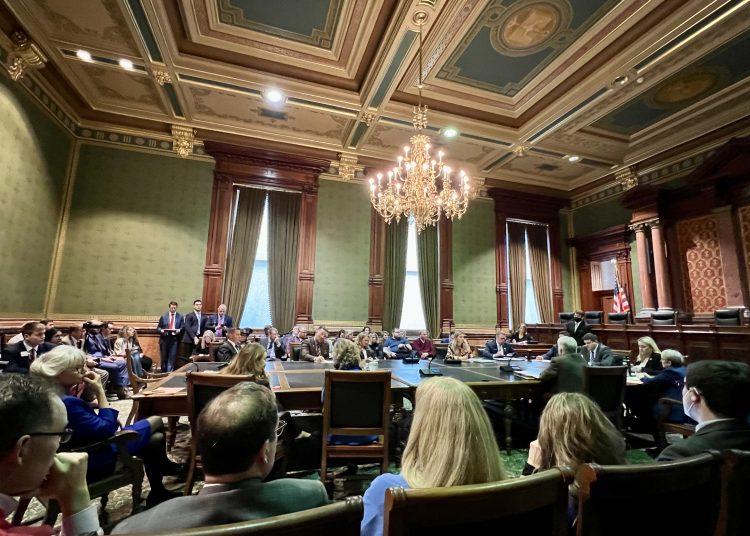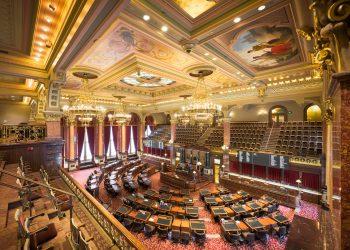DES MOINES, Iowa – Gov. Kim Reynolds’ proposed school choice bill advanced through committees in both the Iowa Senate and Iowa House of Representatives on Wednesday and will head to each chamber’s floor for a vote this session.
The bill (HSB 1/SSB 1022) would bring universal school choice to Iowa families within three years.
“This is just the first step in giving educational freedom to Iowa’s students and parents. For too long government has told parents when, how, and where their kids can receive an education. It’s time for the government to get out of the way and allow parents the freedom of choice in education,” Reynolds said in released statement.
Democrats argued that the bill whose price tag in FY 2024 according to Reynolds’ proposed budget is $106.8 million. The governor said that the program could cost $341 million once the program is fully phased in. State Senator Molly Donahue, D-Cedar Rapids, said that the legislature shouldn’t consider a program like this because school funding hasn’t kept up with inflation. State Senator Sarah Trone Garriott, D-West Des Moines, asked what accountability the program would have and suggested the ESA money could be spent on private tennis and golf lessons.
Republicans argued that the bill provides greater choice for parents who provide the ultimate accountability, and State Senator Amy Sinclair, R-Allerton, argued that the bill won’t destroy public schools because Republican members have kids in public school and will remain in public school.
She also pointed out the bill clearly states that ESA funds must first be spent on tuition and fees at an accredited non-public school.
State Senator Ken Rozenboom, R-Oskaloosa, the Iowa Senate Education Committee chair, told The Iowa Torch that he applauds Reynolds’ vision and courage in her third attempt to pass a bill creating education savings accounts.
“Demands for education choice have been growing louder, particularly after the pandemic. Our kids’ learning was diminished with school closings and mask mandates, but parents learned a lot. And many of them didn’t like what they saw. The time for more education options has come,” he said.
The bill passed along partisan lines 11 to 5 in the Iowa Senate Education Committee and 3 to 2 in the Iowa House Education Reform Committee. The Iowa House Education Reform Committee was established by Iowa House Speaker Pat Grassley, R-New Hartford, to focus on bills containing “significant reforms” to the state’s educational system. Grassley is the chair of the committee.
Last year, the Iowa House Education Committee did not vote on Reynolds’ bill and the chairmen then, former State Rep. Dustin Hite, R-New Sharon, was defeated by a challenger in the Republican primary. The Iowa Senate passed last year’s bill.
This year’s proposed bill from Reynolds is more expansive than the bill she introduced in 2022 that capped the education savings account program to 10,000 and limited it to only incoming kindergartens and students already enrolled in public school whose families met the qualifications.
The bill creates an Education Savings Account program that provides money in accounts for a cafeteria of qualified educational expenses outlined in the legislation but has first to be used for the tuition and fees in the nonpublic school their student is enrolled in before money is spent on any of the other options listed in the bill such as textbooks, educational therapies, or online course work.
If passed, effective for the 2023-24 school year, per pupil funding will be $7,598 per student. Eligible students will include:
Year One:
- All kindergarten students
- All public school students
- Private school students with a household income at or below 300% FPL, $83,250 for a family of four
Year Two:
- All kindergarten students
- All public school students
- Private school students with a household income at or below 400% FPL, $111,000 for a family of four
Year Three:
- All K-12 students in Iowa, regardless of income
Also, public schools will retain approximately $1,202 per pupil in categorical funding for each student who attends private school. So they continue to receive funding for students they are not educating.
Odyssey, Iowa Department of Education, National Alliance of Public Charter Schools, Iowans for Tax Relief, EdChoice, ClassWallet, The FAMiLY Leader, the Governor’s office, Iowa Catholic Conference, American Federation for Children, Iowans for School Choice, Iowa Advocates for Choice in Education, Yes. Every Kid, Opportunity Solutions Project, Americans for Prosperity, and Inspired Life registered support for the bill.
The League of Women Voters of Iowa, Rural School Advocates of Iowa, Urban Education Network of Iowa, Iowa Retired School Personnel Association, Iowa Ace 360, Des Moines Public Schools, One Iowa, School Administrators of Iowa, AFSME Council 61, Episcopal Diocese of Iowa, NAACP, Iowa Association of School Boards, Iowa State Education Association, Iowa Federation of Labor (AFL-CIO), Common Good Iowa, and Interfaith Alliance of Iowa registered opposition against the bill.
Reynolds criticized opponents of the bill.
“It is not shocking to see the same special interest groups who tried to lock our students out of their classrooms advocating against this bill. They were wrong then, and they are wrong now,” she said. “I look forward to this bill reaching the floor in both chambers. Iowans deserve to see where their elected leaders stand.”
















